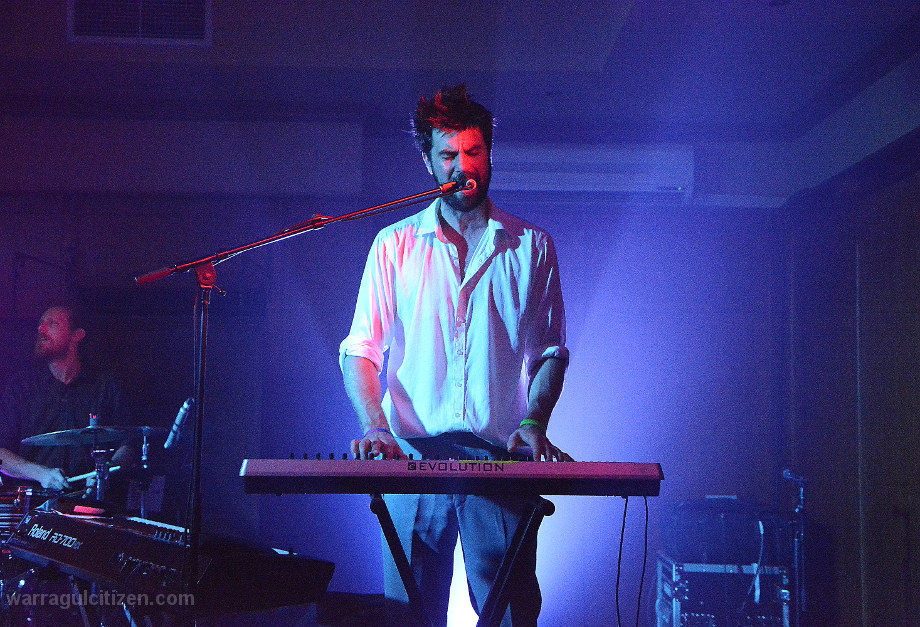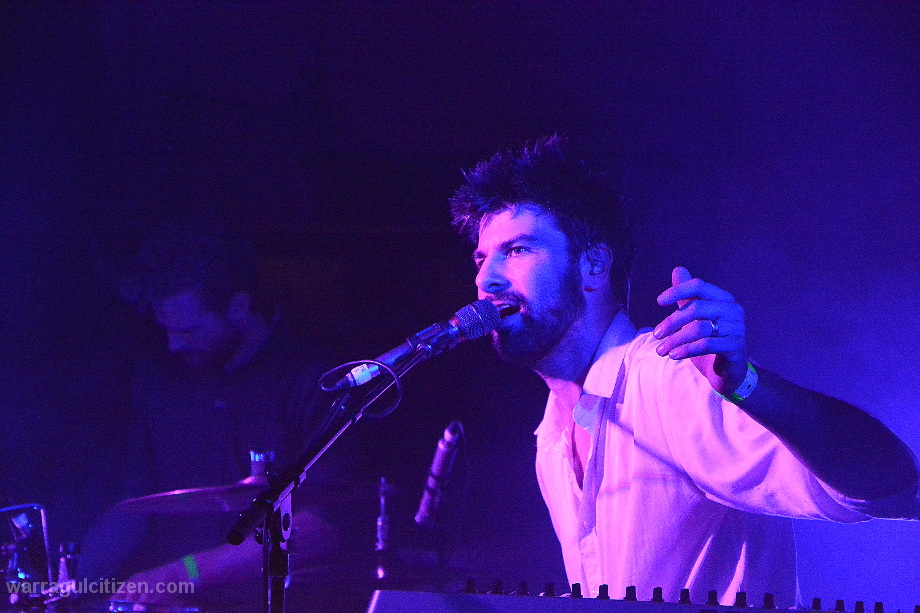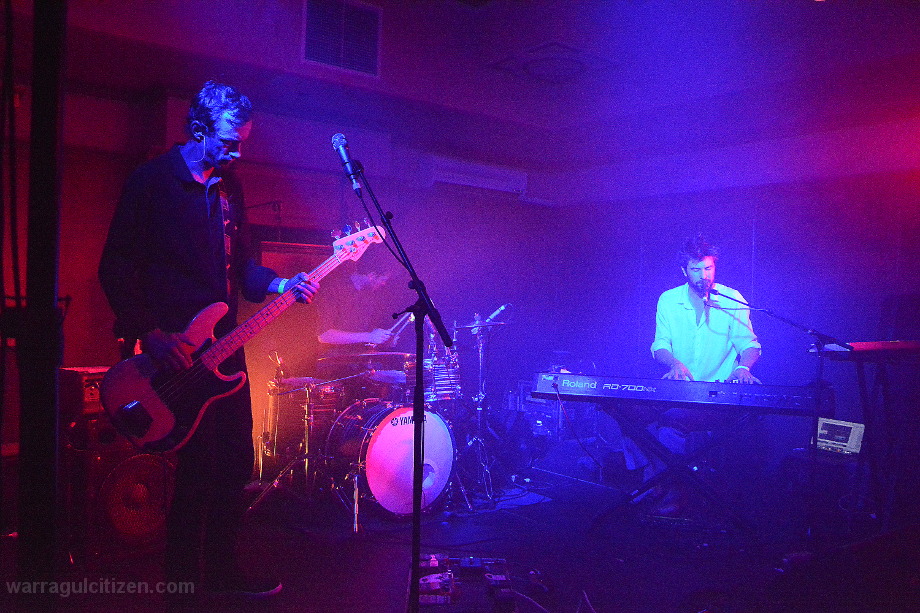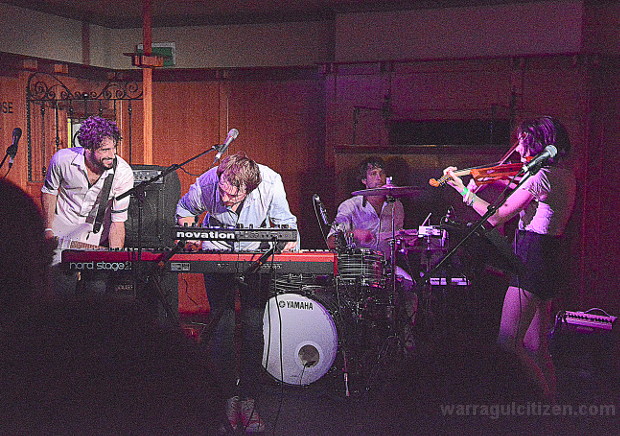

THE ANIMATORS celebrated the launch of the band’s latest EP, Adaptations, with Mercury White and Lobes of Julia in Warragul late in January.
First published in the 13 February edition of the Warragul & Baw Baw Citizen.
The bands played to one of the largest gig turn-outs the O&H has seen in recent months. It was also The Animators’ first local gig in some time, having played across Victoria and New South Wales over recent years.
The Warragul & Baw Baw Citizen caught up with the band’s songwriter, singer, keyboardist and producer, Drouin local David Cuthbertson, to discuss his songwriting, the band and the new EP.
WBBC: What can you tell me about this release?
DC: Adaptations was written in 2013, mainly while I was in Sydney to study. I wrote it all in the bedroom. Back home here I’ve got myself a nice little studio and a space to make music, but up there I had a bedroom and laptop. Basically I got back to really basic songwriting. Lots of ideas, and it evolved from there.
WBBC: The style of this EP did seem more downtempo compared to your previous releases.
DC: I suppose over time your music changes, it would be a bad thing if it didn’t. I come up with a lot of ideas, and I suppose for me only maybe 50 per cent of that fits what I would call The Animators as a musical entity.
WBBC: What happens to the other half of it?

DC: Most of it just sits on a hard drive and doesn’t get released. I have tried to start a side project, but then I wasn’t really ringing true. It may surface. But more than anything I think it’s good to just refine the sound you want to make. I thrash out different ideas, some fall by the wayside but it does make the stuff you end up going with a lot stronger.
[Simon “Sub” Michalski] has had quite a big influence on the sound. I say that most of it comes from my head, but really, in terms of the finished product on the record, there’s a lot of collaboration. This record is really an adaptation of the original idea.
WBBC: So how do you go about writing your music?
DC: I’m a keys player and a vocalist first before any other instruments, and coming from a production background as well, I tend to write either with piano and vocal, or completely within the production environment – programming synths, programming beats, different strange sounds and ideas. I don’t have a set process in terms of putting the words and music together or anything like that. Sometimes the words come first, a lot of the time it’s some weird melody or some weird beat or bassline.
WBBC: What do you listen to?
DC: Funnily enough, I don’t listen to all that much new music. And for that matter I don’t listen to any particularly classic music on the other end of the scale. When I buy an album I usually thrash it to death. Recently I bought the new LAMB album and I’ve finally been getting into that, so they’re an influence I’d say. The trip-hop style actually doesn’t creep in as much as it should, I think, into The Animators. But it will in the future – I’ve been writing again and the trip-hop thing has always fascinated me. It’s kind of cathartic, I think, especially the way LAMB do it. Radiohead have always been something I’ve listened to a lot of…
WBBC: I was going to say, especially vocally, you seem to draw a bit from their sound.
DC: I suppose vocally you have to work with what you’ve got sometimes, but yeah, Thom Yorke’s vocals and the way he does falsetto and then comes down into his normal singing voice is awesome. Music is, for me, about good art. It can overwhelm the senses, and you can send really broad brush stroke messages, but with such great medium because you can totally overwhelm the senses.
WBBC: So when you do something live, what kind of mindset do you take to it?
DC: It’s slightly different. In fact it’s more than slightly different. That’s not really a deliberate thing, it’s just the way you do it. Our mantra is just energy, for live. It’s about getting out there. If you pour energy off stage into the audience, okay you have to play your instrument well and whatever and learn the songs, but your audience generally reciprocates. If you give them energy they will either hate it, or they will be absorbed by it and reflect it. You have this huge sound you can create and a lot more dynamic you can work with.
WBBC: You mentioned production earlier, and that’s your job, right?
DC: I do live production for a job, pretty much because studio production is a hard thing. I do do studio production, and when I started out I did a lot more. Partly the reason why The Animators was formed was I was thinking “I’ve written music, maybe I can put that same production effort I put into another person’s record into my own work.”
WBBC: Now, the two year gap between this EP and the last release…

DC: The study blew a bit of a hole in the timeline. We didn’t start recording Adaptations until the start of 2014. I got a bit of block, I wasn’t sure about the track listing, and came up with what I think was the best result for that EP. There’s no point putting something out unless it’s going to be good. I think the next record is going to be quicker – I’m already writing. Now the live band’s back and playing regularly things will come along a lot easier.
WBBC: So, what’s it like for you to do a home gig?
DC: Awesome! We used to make a point of coming home at the end of the year. There’s a little less pressure I suppose, but in a way that’s probably not such a good thing sometimes. But really, it’s just a nice and comfortable crowd. It is a little challenging because I’m not a very serious guy, but we play pretty serious music, and when you look out and can see all your friends you’re like “oh, I know this person likes this one or this person hates this one, oh I made a mistake.” If we could do it more often we would.
WBBC: Looking at the local scene, there is more live music happening here now.
DC: Yeah, I think it’s, to be honest, just something that takes energy. There’s no good times or bad times; there’s always going to be young musicians coming through, it’s just a matter of whether or not there’s an outlet for it and whether or not they’ve got the energy to get up and give it a push. And be good, you have to be good.
WBBC: How long have you been making music for?
DC: The Animators started in 2009. The first EP [we] weren’t going to play live, but a friend of mine picked it up and wanted all the music for his film and we had to do it live at the premières. Before that, since I was a kid. I started playing piano when I was three, gave it up for the first time when I was 10. I studied classical piano, gave that up when I was in my teens. Started elbowing it, kicking it, and the classical teachers didn’t like that. I was into a lot of Ben Folds when I was growing up and in my teens and I loved the way that was visceral, and the technique was second to the feeling.
WBBC: You’re also a member of Liquid Horse, which is kind of like a local covers supergroup.
DC: That’s such a whole lot of fun. I have no idea about any of these songs when I’m walking in because it wasn’t the music I listened to. It’s almost blasphemous to say that, but these are amazing songs and amazing bands, I just never really got into it. We get in there and just jam out covers. To be in more than one band, to have another outlet where you just turn up and play, it’s refreshing.
WBBC: What’s next?

Above: Mercury White, who supported The Animators at the 24 January gig.
DC: We’re going to be recording, it’s going to be an album.
WBBC: You played something new at the gig in Warragul.
DC: That’s called Slow Descent into Happiness. It probably won’t remain called that. We do that from time to time. It’s funny, some songs that we play live we’ve never released. The song called Overdrive that we played the other night, we’ve tried to record that three or four times and I think that lends to the whole live vs produced difference. I think it’s awesome, but people have trouble talking about it, “why do you sound different live?” It’s a different energy. You go to put down a song you predominantly wrote for live, crowd loves it, and you just go “where is it?” On the tape it doesn’t jump out of the speakers at all.
WBBC: How’s the new EP been received?
DC: Good. Everyone I’ve spoken to has liked it, the radio stations and community radio have been great. There’s a certain element of putting music out there after you’ve been out of it for a while that is a little difficult. You have to be bloody good now for people to like it!
You can hear The Animators’ new EP and all other releases from the band online. Simply head to theanimators.bandcamp.com.

More like this:
Peter Gabriel has released his first new music since 2013, and it sounds pretty… well… Amazing!
Just a couple of days after releasing Burn The Witch, Radiohead has dropped its latest song – Daydreaming.
After all the fuss – or lack thereof – over the last few days, Radiohead finally dropped Burn The Witch an hour ago.
It seems Radiohead forgot about Google+ when deleting everything it has ever posted on the internet – the band’s one upload remains!
Like most Radiohead fans, I have learnt not to read too much into anything the band says or does between releases. But deleting every post from every social media platform and an entire website cannot go without comment; especially when an […]
THE FAT cat has long been a derisive representation the über-wealthy and greedy, and a new exhibition will put that food-shovelling image front and centre.